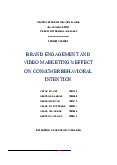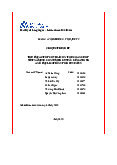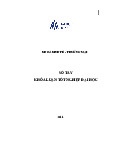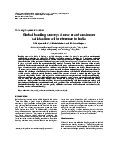



















Preview text:
INTRODUCTION 1 INTRODUCTION1 1.1 WHAT IS MORPHOLOGY? – means ‗shape, form‘, and 1.2
THE EMERGENCE OF MORPHOLOGY 2 INTRODUCTION 1.3
MORPHOLOGY IN AMERICAN STRUCTURAL LINGUISTICS INTRODUCTION […]. 4 WHAT IS A WORD? 2 WHAT IS A WORD? 2 2.1 THE LEXEME WHAT IS A WORD? 2.2 WORD-FORM 2.3
CONTTENT WORDS AND FUNCTION WORDS — 6 WHAT IS A WORD? — What do you mean? Ho H w o ’ w s ’ s y o y ur o ur 5 0 5 0 0 - We W l e ll,l ,b a b s a e s d e d o n o wo w r o d r d h i h s i t s o t r o y r y pa p s a t s t p e p r e f r o f r o m r a m nc a e nc , e ,
I know I’ll use “the” about 25 times, pa p p a e p r e r c o c m o i m ng i ? ng ? I’ I m ’ m r e r a e d a y d y a a
“and” at least 15. “in”, “if”,”it” and qua q r ua t r e t r e r d o d ne o . ne .
“but” should give me another 30-40.
Toss in the usual “is”, “was”, “will be
verb assortment and I’m sitting
comfortably at 120-plus words before I even start. Th T e h e k e k y e y t o t o w r w i r t i i t n i g n g Yo Y u o u nev ne e v r e r a a h i h s i t s o t r o y r y e s e s s a s y a y i s i s fa f i a li l to t o Th T a h nks a . nks .W h W o h ' o d d w e w e kno k w no i w ng i ng y o y ur o ur am a a m z a e z e m e m . e . fi f g i h g t h t i n i W n o W r o l r d l d W a W r a r I , I , es e s s a s y a y h i h s i t s o t r o y r . y . by b y t h t e h e w a w y a ? y ? […] WHAT IS A WORD? 2.4
WORDS AND THEIR GRAMMATICAL CATEGORIES […] In a dictionary […]
morphosyntactic categories for which they inflect. At the section‘s conclusion we 8 WHAT IS A WORD? ‗ ‘ […] WHAT IS A WORD? — 10 WHAT IS A WORD?
(John Steinbeck, ‗Johnny Bear‘) […] WHAT IS A WORD? —
s called the perfect participle. […] […] 12 WHAT IS A WORD? MORPHEMES 3 MORPHEMES 3 3.1
MORPHEMES: THE SMALLEST UNITS OF MEANING 14 MORPHEMES […] […] MORPHEMES
3.2 MORPHEMES, MORPHS AND ALLOMORPHS ‗I‘ ‗she‘ ‗he‘ ‗the‘ ‗car‘
‗park‘ – – ‗ ed‘ ‗ s‘ 16 MORPHEMES ―past tense” 3.3 TYPES OF MORPHEMES 3.3.1 Roots and Stems MORPHEMES
3.3.2 Free and Bound Morphemes
“ L O O K S L I K E WE S P E N D M O S T O F O U R T I M E
INGING. YOU KNOW, LIKE SLEEPING, EATING,
RUNNING, CLIMBING” 18 MORPHEMES
3.3.3 Inlectional and Derivational Morphemes […] M nction.[…]
3.3.3.1 Derivational Morphemes […] MORPHEMES ―not‖ ―not‖ ―reversive‖ ―reversive‖ ―not‖ ―not‖ ―not‖ ―again‖ ―former‖ ―put in‖ ―status‖ ―state or condition‖
―quality, state or condition‖ ―state or condition‖
action indicated by the verb‖ ―without‖ ―having‖ ―pertaining to‖
―pertaining to, of the kind‖ ―pertaining to or act of‖ ―agent who does whatever erb indicate‖ ―manner‖ 20 MORPHEMES




